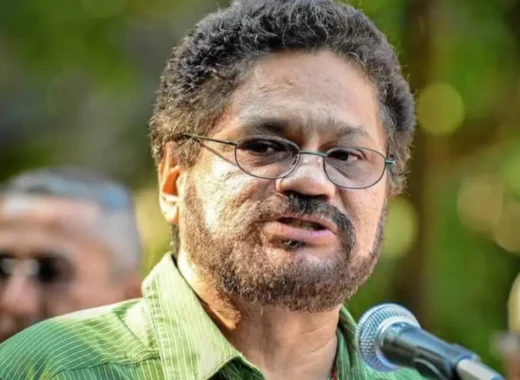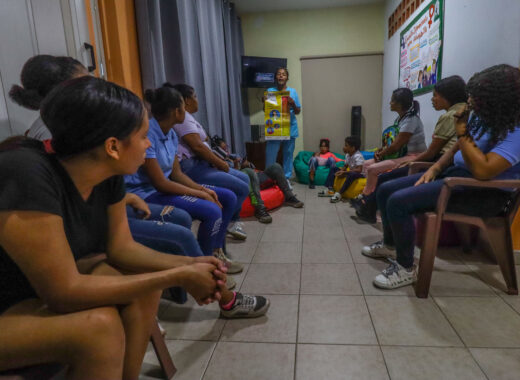Blaming all ills on sanctions: Chavismo's disinformation strategy to face the economic crisis
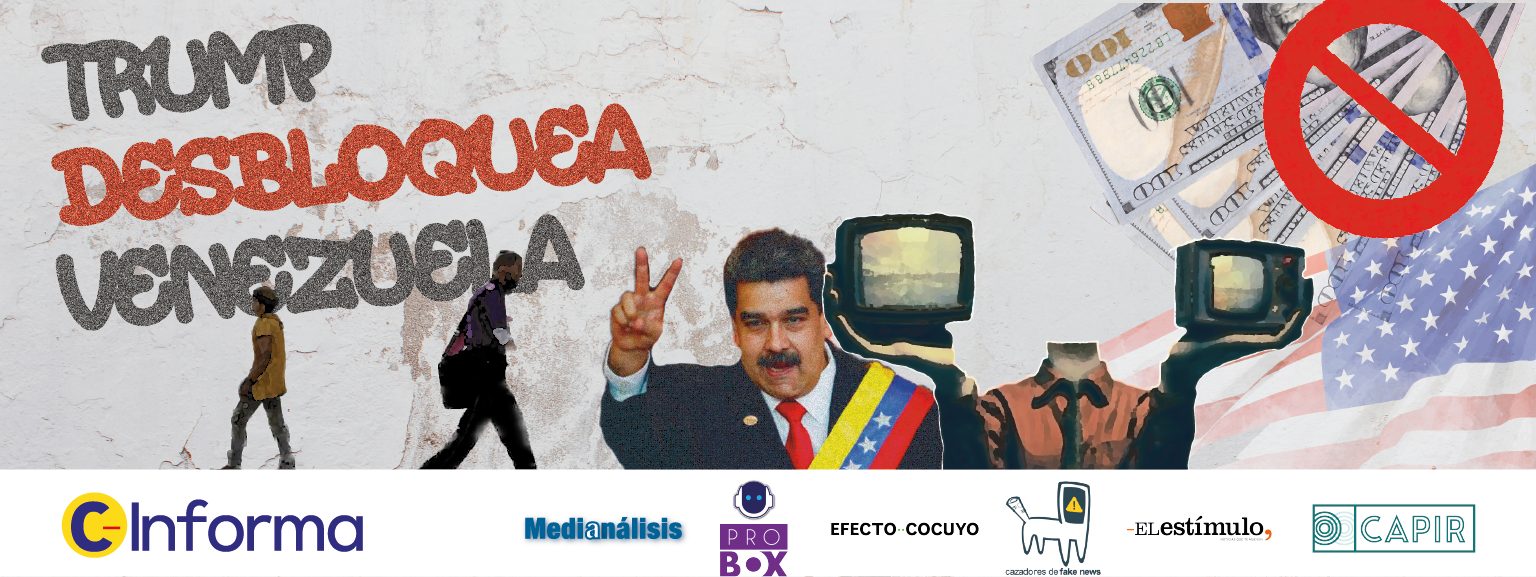
A lie embellished and well packaged as truth is a usual tool among the communication strategists of Nicolás Maduro’s government. Despite the serious economic crisis that Venezuela has been experiencing for the last 10 years, the focus has been to find, blame, and attack others, be it the media, opponents, businesspeople and, more recently, U.S. sanctions
Looking outwards to blame others for the economic and social disaster is key in the government’s communication strategy. Persisting in a narrative that victimizes a regime holding the largest amount of oil revenue money in the history of the country in its hands has remained a priority during the last years. To achieve this objective, the use of government broadcast and social media has been systematic.
From the News Coalition (Coalición Informativa, C-Informa), formed by Cazadores de Fake News, Efecto Cocuyo, El Estímulo, Medianálisis and ProBox, we have detected how these mechanisms of disinformation and propaganda have been used for years to name the sanctions imposed by the United States on Venezuela as culprit for the complex humanitarian crisis.
Initially, this communicational strategy has framed the origin of the economic debacle in 2013; but when the U.S. Treasury Department’s Office of Foreign Assets Control (OFAC) issued its first economic sanction by late 2018, Venezuela was nearing five full years in recession, with an accumulated drop of more than 40% in its Gross Domestic Product (GDP), a significant contraction in its international trade, and a steep inflationary process.
In a report released by the NGO Venezuelan Education-Action Program on Human Rights (Programa Venezolano de Educación-Acción en Derechos Humanos, Provea)at the end of 2020 titled Las sanciones económicas contra Venezuela: consecuencias, crisis humanitaria, alternativas y acuerdo humanitario (The Economic Sanctions against Venezuela: Consequences, Humanitarian Crisis, Alternatives, and Humanitarian Agreement), economist Manuel Sutherland, director of the Workers’ Research and Training Center (Centro de Investigación y Formación Obrera, CIFO), clearly remarks:
[…] sanctions have come to be a catch-all excuse for all the current problems, which does not seem to be entirely true, since there is a kind of amnesia linked to a series of economic policies that have been the basis of a crisis well before the sanctioning persecution.
Pre-sanctions crisis: What Maduro wants forgotten
The OFAC has issued930 sanctionstargeting officials, institutions, companies, aircraft and ships associated with the government of Nicolás Maduro; but only a small percentage of these sanctions directly or indirectly affect the country’s economy.
Thesanctionsimposed from 2008 through mid-2017 were enforced on individuals involved in human rights violations, drug trafficking, high levels of corruption, and electoral fraud. Those issued in 2014, during Barack Obama’s administration, further sought to prevent the use of the U.S. financial system for these activities.
The starting point of the sanctions that could have caused financial and economic imbalances in the country can be traced back to August 24, 2017. At that time, the government of Donald Trump issued Executive Order 13808, banning transactions related to providing financing to any of Venezuela’s agencies or entities, including the state-owned Petróleos de Venezuela (PDVSA), thereby preventing new debt or bonds from being issued, existing bonds from being traded, or assets from being sold in the U.S.
However, for many economic analysts, these measures did not have a significant effect on the dynamics of Venezuelan finances. According to Sutherland, they only came to give legal confirmation to a certain impossibility: «Nobody wants to purchase Venezuelan or PDVSA bonds, and the current holders refuse to negotiate a restructuring».
Consequently, it was in November 2018 when the first measure considered to affect national revenues was issued. Executive Order 13850imposed sanctions targeting gold exports and other sectors of the economy.
Just two months later, this same executive order was expanded to include new sanctions on state-owned PDVSA, meaning that all properties of this oil company under U.S. jurisdiction became blocked. In addition, any U.S. person was prohibited from doing business with the Venezuelan company.
That same year, this was followed by sanctions against theCentral Bank of Venezuela (Banco Central de Venezuela, BCV), governors allegiant to Maduro, state-owned banks such as Bandes and Banco de Venezuela, and the state-owned airline Conviasa. In addition, companies providing transportation services to PDVSA and dozens of vessels, some owned by the state-owned oil company, were sanctioned. In 2018, Trump also signed new sanctions against Russia and Iran which, thanks to several laws passed after the 9/11 attacks, did not require review by the US Congress.
By that 2018, poverty in Venezuela already reached 88% of the population according to theLiving Conditions Survey (Encuesta de Condiciones de Vida (Encovi), the minimum wage stood at just USD 2.2 (at the parallel exchange rate). In addition, less than 3 million Venezuelans had fled the country, according tofigures from the UN Refugee Agency (UNHCR).
Prior to sanctions, the economy was already in intensive care. The country entered a long period ofhyperinflation in November 2017, at a rate of over 2,800% towards the end of that year, and closed 2018 with a price index increase above 130,000% (although admitted to half that figure by official entities).
Likewise, according to the Economic Commission for Latin America and the Caribbean (ECLAC), the country accumulated a 48% drop in its GDP between 2013 and 2018.
Despite these figures, the narrative of sanctions as catalysts of the economic downfall became institutional practice. In 2020, the country’s Official Gazette published theConstitutional Anti-Blockade Act on National Development and Guarantee of Human Rights (Ley Constitucional Antibloqueo para el Desarrollo Nacional y la Garantía de los Derechos Humanos). Since then, the Venezuelan Anti-Blockade Observatory, affiliated to the International Center for Productive Investment (Centro Internacional de Inversión Productiva, CIIP), was established under the guidelines of the People’s Ministry for Economy, Finance, and Foreign Trade.
Anti-sanctions propaganda as an online strategy
Blaming sanctions for the economic and social problems in Venezuela not only involves spokespersons of the Maduro administration, but also this narrative is actively boosted on broadcast media outlets and social media accounts of government agencies. An analysis by ProBox Digital Observatory reveals that, throughout 2022, over 3.4 million tweets revolving around 18 trending topics addressed the issue of sanctions in Venezuela. This narrative was primarily boosted by accounts linked to the Venezuelan regime.
In a dynamic that is far from authentic, the People’s Ministry for Communication and Information (Ministerio del Poder Popular para la Comunicación y la Información, Mippci) played a central role in boosting the daily hashtags used in most of the tweets found (representing 95%). This was coupled by government entities and high-ranking officials of the regime such as Diosdado Cabello, former National Assembly speaker, former vice-president, former minister on several occasions, and one of the leading spokespersons on his own national TV show.
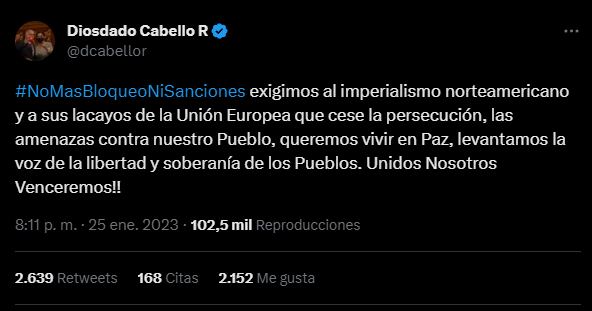
Albeit systematic, the momentum of the sanctions narrative witnessed an exponential growth in the first four months of 2023. During that period, the online campaign amounted to 39 trending topics and almost 30 million tweets, with some hashtags such as#LasSancionesSonCriminales(#SanctionsAreCriminal) and#NoMasBloqueoNiSanciones(#NoMoreBlockadeOrSanctions) standing out for an over 76% increase in the number of related tweets.
The inorganic nature of orchestrated coordinated action among accounts to mimic popular support also increased. While in 2022 the conversation about sanctions on Twitter showed an inorganic activity rate of around 65%, this unauthentic buzz, which undoubtedly violates the rules of use of this social media app, exceeded 90% in the first five months of 2023.
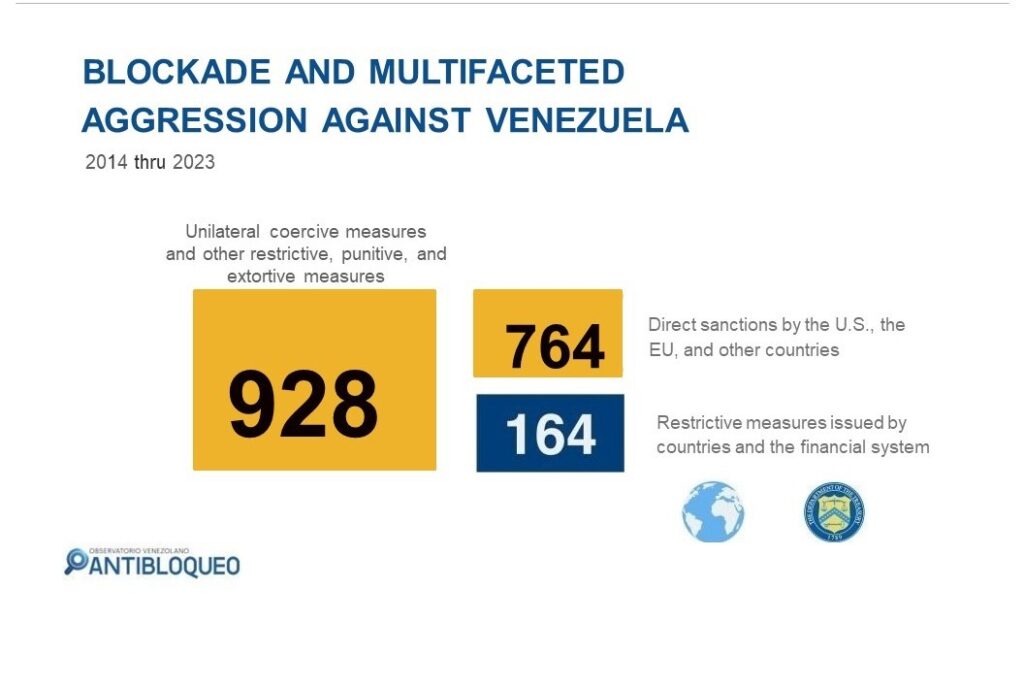
The figures point to an unmistaken finding. The Maduro regime is the only force boosting the narrative of assigning blame to sanctions. Moreover, it does so hand in hand with the MIPPCI, by misappropriating institutional resources and social media accounts of citizenspaid with government funds for this activity.
This increase noticed in 2023 was supplemented by the effort to establish the narrative of a widespread ‘popular rejection’ of these measures in the form of public demonstrations. This trend can be confirmed in the coverage of such propaganda media as Venezolana de Televisión (VTV), its website and social media.
On at least 15 occasions, VTV used its Facebook page to disseminate news on demonstrations and rallies staged in Venezuela in rejection of the sanctions. Unfortunately, coverage of the events was biased.
In most instances, it was generically implied that these protesters were by ‘the people’ (from Anzoátegui, Aragua, Maiquetía, Miranda, Caracas), instead of specifying that they were mobilizations primarily of ruling United Socialist Party of Venezuela (Partido Socialista Unido de Venezuela, PSUV) activists and supporters and close political entities – such as the Tupamaro Movement (Movimiento Tupamaro) – or part of the government itself.
These public demonstrations would give momentum to the main narrative of blaming U.S. sanctions for the economic downfall and the production standstill, especially oil sales. However, a thorough historic check of the measures reveals an attempt at assigning blame.
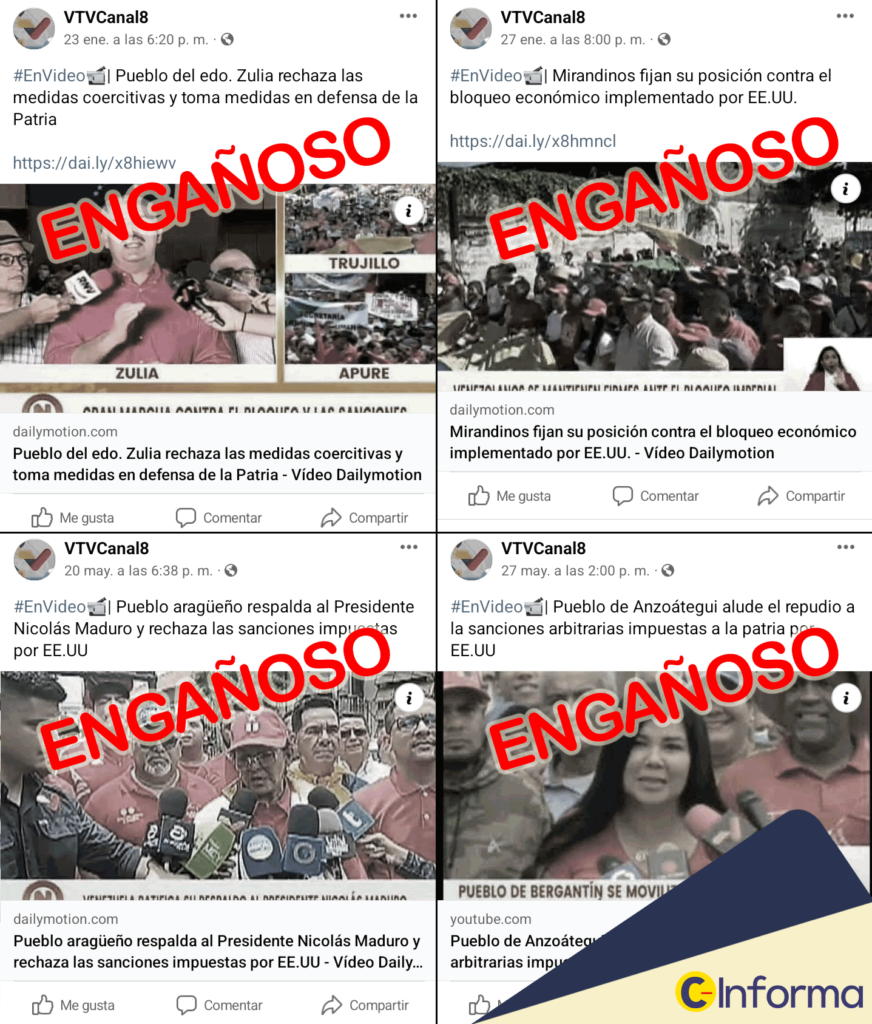
Iran, a scientific power under sanctions
The Islamic Republic of Iran has faced sanctions from the U.S. since 1979, from the European Union (E.U.) since 2010 and from the United Nations (U.N.) since 2006following its development of nuclear weapons, violation of human rights, and support for global terrorism. This has especially affected its oil export revenues and impacted its economy.
However, this country has managed to establish education and innovation policies allowing it to be one of the leaders in academic output worldwide. At the same time, it has found alternative markets such as Venezuela, with which it has signed agreements to open assembly plants for its automobile brands, repair refineries, build houses, and even sell gasoline.
An official Iranian news itemrevealedthat exports to Venezuela grew more than 400% in 2022 thanks to sales of «fisheries, sweets and chocolates, motor oil, chemical products, medicines and vaccines, fertilizers, detergents, apparel, handicrafts, tiles and ceramics, all kinds of pipes and plumbing items, valves, foundry machines, tractors, tanker trucks, syringes, and electronic equipment». In turn, Caracas sends to Teheran «aircraft components and parts as well as electronic devices».
Iran, sanctioned for many more years, is capable of exporting goods that should be manufactured by Venezuelan industries; but it has barely managed to sell the former a couple of items. An economic fact stands out to make another comparison: Venezuela sold Iran USD 816,000 while Cuba, another country sanctioned for a longer and more severe period, was able to export to Iran goods for USD 12 million, fifteen times more than Venezuela.
Venezuela’s technological lag
On the website of the Observatory of Economic Complexity (OEC), based on Harvard University’s Atlas of Economic Complexity, international trade data can be viewed. Its platform, which measures the knowledge intensity of an economy by assessing the knowledge intensity of the products it exports, allows a comparison between both countries.
In this regard, the Economic Complexity Index (ECI), which weights cell phone exports higher than gold mining, ranked Iran 67th and Venezuela 110th in 2021. This is a considerable technological and scientific lag with a backward trend. In 1998, Venezuela was ranked 41st while Iran was only 76th. The Atlas explains that a product that is complex and innovative in one year drops considerably over time and even falls out of the technologically advanced goods listed.
Consequently, while Iran ranked 85th in export volume with USD 14 bn, Venezuela dropped to 135th with USD 3.2 bn in exports. Its dominant export good was no longer oil but scrap metal.
It is worth noting that Iran also outranks Venezuela in its two main buyers, China and Turkey. In 2021 Venezuela sold them goods for USD 843 million and USD 452 million respectively, while the Islamic country sold them USD 5.94 bn and USD 2.72 bn, nine times more.
While by 2009 Venezuela’s share of the world oil export market was 4.5%, it fell to 1.56% in 2015 and, by 2017, a year before the first economic sanctions, it dropped to 1.04%.
The Atlas of Economic Complexity report notes that the country has not undertaken the structural transformation process to make its economy more sophisticated. Therefore, its reliance on reduced export goods, made up of 63% oil and derivatives, has led to a «worrisome» decrease in revenues.
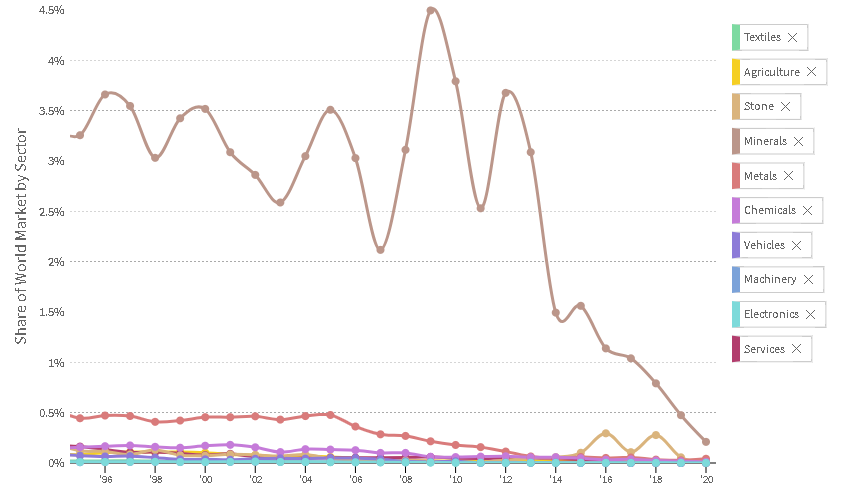
On the other hand, Iran’sexport portfolio boasts a variety of petrochemical and metallurgical industry products of medium-high complexity, especially incopper and plastics. Of particular note are ethylene polymers, of which it exported $3.2 billion(almost 50% more than in 2020 and all that Venezuela exported that year) in 2021. This product ranks 29th among the most purchased goods in the world.
While they have not fully solved Iran’s financial woes, these achievements were obtained by implementing what officials dubbed a ‘resistance economy’. This also allowed Iran to become a leader in quality academic output.
One example is found in theNature Index 2022, which measures the quantity and quality of academic papers on pure sciences between March 2022 and February 2023. In this index, Iran ranks 32nd with 285 publications and Venezuela 93rd with 21 papers.
This drive to generate knowledge help Iran stand out as one of the six countries that showed the highest annual growth in scientific output. It even ranked among the top 20 worldwide before the COVID-19 pandemic.
Even the US National Science Council ranked Iran 15thworldwide in science and engineering article output between 2010 and 2020. In this period, it reached 2% of the world’s published knowledge and an annual growth of 9%.
This achievement also contrasts sharply with Venezuela’s science policies, which have drastically curtailed the budget and autonomy of universities and research centers. Furthermore, it has neglected the Venezuelan Institute for Scientific Research (Instituto Venezolano de Investigaciones Científicas, IVIC). Its workers and researchers have taken to thestreets in protest for better salaries and working conditions since 2017. In some instances, this has included basic services such as a cafeteria in a facility with residing researchers located away from urban hubs.
The strategies that Iran has implemented so that sanctions by foreign governments may not drastically impact its economy is very different from those the Venezuelan government has. The latter has not focused on diversifying its economy or industrializing the country, but on implementing disinformation strategies and a victimization narrative. In two more installments, C-Informa will show how the destruction of the oil industry was concealed, as well as how the country’s healthcare system was impoverished while labor protests seeking to unveil misery wages behind propaganda were silenced.
This research is part of publications by C-Informa, a Venezuelan journalistic alliance that aims to fact-check disinformation and is formed by Medianálisis, Efecto Cocuyo, El Estímulo, Cazadores de Fake News, and ProBox, assisted by the Consortium to Support Independent Journalism in the Region (Consorcio para Apoyar el Periodismo Independiente en la Región, CAPIR), headed by the Institute for War and Peace Reporting (IWPR), and under the advice of Argentina’s fact-checking initiative Chequeado.

